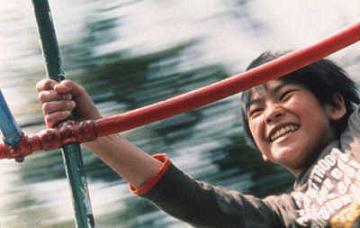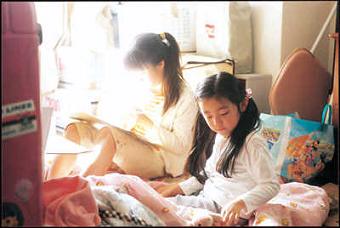

In 1988, four children were discovered in Japan, living by themselves in an apartment. Their mother abandoned them for a few months, leaving them to fend for themselves. The real scary part was that their neighbors had no idea. Hirokazu Kore-eda (Distance, After Life) uses these actual events as a beginning point for his harrowing film Nobody Knows, about four children abandoned by their mother in a small apartment. In the very beginning of the film, the five look like one big happy family, but it becomes apparent that this is not the case. Keiko (You, Moon Child, Stereo Future) hid her two youngest children in suitcases when moving into their new apartment. She lied to the manager, telling him she only has one child. Once all four children are there, she tells them that they are not allowed outside and stay quiet at all times.
Keiko then leaves on one of many trips. Sometimes she is gone for the day, sometimes for weeks on end. The four kids do not go to school. The eldest, Akira (Yayu Yagira) is the de facto authority figure. He buys the food, cooks, pays the bills, and tends to the others. He must also protect them from discovery, lest the government split them up. It is Kyoko's (Ayu Kitaura) job to wash the clothes. The two youngest are the rambunctious Shigeru (Hiei Kimura) and the adorable Yuki (Momoko Shimizu). Kore-eda chose non-actors for the children and filmed over the course of a year, so one can actually see the kids growing up. As time passes, Keiko stays away for longer, until it becomes clear that she is not coming back. Akira and Kyoko realize this, but hide this from Shigeru and Yuki, who are too young to know.
It is impressive how un-childlike these actors are. All the joys of being a kid are missing. Keiko's irresponsibility forces Akira to grow up much too quickly. As a result, he is very quiet, serious, and withdrawn. Kyoko is much the same. It is scary watching them go about their day, and only increases the anger the viewer feels at Keiko. Kore-eda paces things slowly (this is nearly two and one-half hours), letting the inherent creepiness of the situation gradually seep to the surface. This sometimes has the opposite effect of wearing out the viewer, and causing them to wonder just how four kids could survive for so long (apparently it did happen, so they obviously found a way).
When good things do happen (not often), the children reemerge, smiling and happy. However, as time passes, conditions worsen for everybody. There is not much to be happy about amidst the absence of a parental figure and potential danger around every corner. The apartment becomes a pigsty, littered with trash and dirty dishes, and their lives seem to be slipping away. People watching know that this is a situation only begging for something awful to happen. The fact that Kore-eda has things happen so matter-of-factly just makes it worse. Things happen gradually, so he lulls everybody into a sense of complacency. All of a sudden, people realize how bad things are, and they know that any problems that any problems that arise are probably too difficult for Akira and his siblings to deal with.